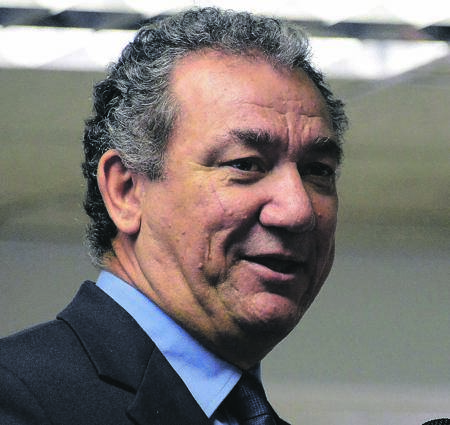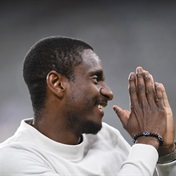
Delegation sent packing by the oversight body that accused it of not taking the briefing seriously
The sports portfolio committee has accused the SA Sports Confederation and Olympic Committee (Sascoc) of disrespecting the parliamentary oversight structure.
This after only six of the 11 Sascoc board members pitched in Parliament on Friday to brief the committee on the progress made regarding the implementation of recommendations by the ministerial committee and preparations for the Olympic Games in Japan this year.
As a result, the Sascoc delegation was stopped from making its presentation as the watchdog body had expected all the board members of the local Olympic governing body to be present.
Sascoc interim president Barry Hendricks confirmed that their trip to Cape Town was fruitless.
City Press could not reach portfolio chairperson Beauty Dlulane, but committee member Tsepo Mhlongo confirmed that Parliament didn’t take kindly to the turn of events on Friday.
“It showed that they don’t respect the committee and we told them to come back prepared. Sascoc always behaves as if it’s being run by an individual,” said Mhlongo.
“Remember, we are doing oversight work and we had expected them to brief us on how far they have gone in implementing the recommendations of the ministerial committee, as well as their preparations for the Olympics.
“We understand that there are also some serious issues that athletes are not happy about – such as the selection criteria.”
Hendricks, however, said significant progress had been made since Sascoc was ordered by the sports and culture department to meet the reforms outlined by the ministerial inquiry that investigated allegations of maladministration and financial irregularities at the embattled confederation.
Key among the 44 pointers was the proposal that some parts of the Sascoc constitution should be amended to ensure good governance.
Hendricks said these were deliberated on, amended and adopted during a special general meeting at Olympic House last month.
Another key proposal was the call for early elections to elect new leadership after Gideon Sam stepped down as president in December. He could not continue because board members cannot be older than 70.
“A process has been put in place for our quadrennial elections on March 28,” Hendricks confirmed.
He said Sascoc was setting up a nominations committee of independent people to oversee the elections.
Hendricks said the Olympics body would also co-opt legal and financial specialists in the board, as per the ministerial committee’s recommendations.
Funding
Sascoc is in desperate need of money to prepare Team SA for the Games, and is hoping for an improved budget allocation to take the team to Tokyo.
It had initially budgeted R30 million for the Olympic team, and about R17 million for the Paralympic team.
Sascoc announced during the six-month countdown last month that it would be sending its “largest delegation of athletes since the Beijing [Olympics in] 2008”.
Team SA is expected to have at least 228 athletes from across 25 sporting codes.
So far, 101 athletes have qualified across nine sporting codes, with more still hoping to meet the qualification requirements.
Sascoc’s financial problems came to the fore late last year, when it didn’t have enough funds to send a team of 153 athletes to the All Africa Games in Morocco in September.
It had projected R20 million was needed, but it only got R11 million from the sports and culture department.
As a result, it sent a drastically reduced team to the continental event.
Acting Sascoc chief executive Ravi Govender said: “It’s always wise to take the best quality team to give us the best chance of success. That’s why our selection policies are very stringent.
“We put in place higher levels of qualification compared with other international federations. Our members feel we need to revisit that and, in terms of due process, they’ve engaged us and made proposals that we must relax the selection criteria.
“If we relax the selection criteria, more athletes will qualify and there will be bigger teams. Ultimately, that’ll impact our costs. That process has unfolded and the bigger team is the result of that due process. We just have to enhance our initiatives to ensure we’re able to raise the funds needed.
“The national federations are aware of the impact of a bigger team on the funding issue. At that special annual general meeting, they resolved that, wherever they can, they’d also assist Sascoc in raising the required funding,” Govender said.
Where will the money come from?
Sascoc’s main sources of funding are the National Lotteries Commission, the department of sports and culture and a year-on-year grant from the International Olympic Committee’s solidarity fund.
That money mostly goes to Sascoc’s general operations.
Hendricks said they had already met with the National Lotteries Commission and the sports department, and were waiting to hear how much Team SA would get.
The International Olympic Committee and the local organising committee for the Tokyo Games will pay airfares to Japan and take care of accommodation for all the athletes as per standard policy.
Conditions to get funding
While Sports and Culture Minister Nathi Mthethwa assured Sascoc during its annual general meeting in November that funds were available, he said the confederation first needed to meet the reforms as set out by the ministerial inquiry.
Top athletes feeling the pinch
Sascoc’s Operation Excellence programme (Opex) helps athletes with medical bills.
But to show how precarious the embattled Opex’s funds are, world 400m record holder and defending Olympic champion Wayde van Niekerk was a high-profile casualty of Sascoc’s need to rob Peter to pay Paul.
Van Niekerk’s camp is unhappy that he is receiving a fraction of what other athletes affiliated to Opex are getting.
It is also questioning the timing of his allocation’s reduction – just six months before the Tokyo Games – after standing by him throughout his knee injury.
Govender did his best to rationalise Sascoc’s position: “Wayde is one of our star athletes, we know his track record. But we must not forget the fact that he’s had a very serious injury. And Wayde is not a Sascoc responsibility, he’s an Athletics SA responsibility, and I know for a fact that they’re looking after him and managing him.
“[But] we haven’t taken him off our Opex programme; what we’ve done is help him a little bit with his medical costs because the costs for the type of treatment he needs are phenomenal.
“We’ve kept him on the Opex programme; we’ve just reduced his allocation to focus on providing him with some medical support.”
‘New’ Opex approach
“We don’t look at Opex based on individuals, we look at it in terms of the principles we need to apply. It’s public knowledge that Sascoc is struggling financially to fund many of its initiatives,” explained Govender.
“I think it’s wrong to use the word cutback ... what we’ve done is say that whatever financial resources we’ve got, we’re allocating meaningfully among the athletes in our Opex programme.
“Where some athletes are more advanced in their preparations for Tokyo, we’re going to support them a bit more, whereas where some athletes are still hopefuls, we’ll adjust accordingly.”
This is somewhat a contradiction, given that the changes to Van Niekerk’s allocation are final. Govender claimed that they were still working on the various athletes’ allocations.
Hendricks said Sascoc had already identified potential athletes who would be part of the South African team that heads to the Olympics.




 Publications
Publications
 Partners
Partners









